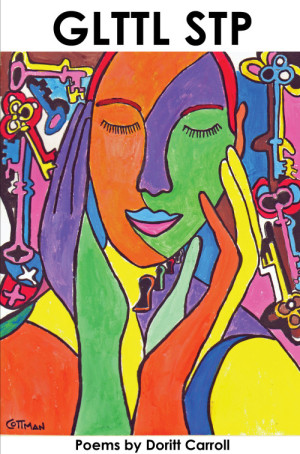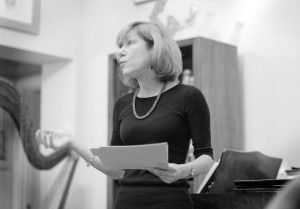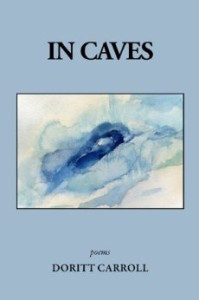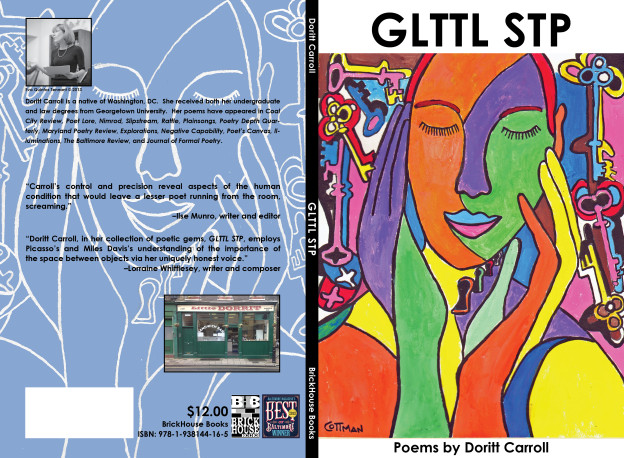
If you ask her, Doritt Carroll will tell you that she is (unfortunately) a lawyer and (fortunately) the mother of two daughters. She received her undergraduate and law degrees from Georgetown University. Her collection In Caves was published in 2010 by Brickhouse Books. Her poems have also appeared in a long list of publications, including Coal City Review, Poet Lore, Nimrod, Slipstream, Rattle, The Baltimore Review, and the Journal of Formal Poetry. Her poem “motherlove” appeared in the Fuck Poems anthology by Lavender Ink. Her book Glttl Stp will be published in September 2013. Ilse Munro write of this latest volume that “Carroll’s control and precision reveal aspects of the human condition that would leave a lesser poet running from the room, screaming.” Lorraine Whittlesey describes Carroll’s voice as “uniquely honest,” a voice that employs “Picasso’s and Miles Davis’s understanding of the importance of the space between objects.”
HUERGO: What moves you to write? 
CARROLL: I don’t know if I’m exactly answering your question, but when I write, I’m having a conversation. I want someone to see something I’ve seen, in the way that I’ve seen it. Often, I’m writing to someone who wouldn’t actually listen if I called them up to describe it. And, to be fully frank, I’m often imagining that if I write something good enough, people will be proud of me, people who could never be proud of me in real life.
HUERGO: How would you describe your drafting and revision process?
CARROLL: I think i’m different from other poets. I’m not a good reviser. If I get myself in a position in which extensive revisions are necessary, I may never finish the poem. It’s almost as if, by writing it down, I’ve painted myself into a corner. So when I get an idea, I try NOT to write it down or even say it out loud. Instead, I arrange it and change it completely in my mind. I only start writing when I’m pretty sure it’s in the right form, and only minor alterations, such as line breaks or avoiding the repetition of a word, will be needed.
HUERGO: What is the most important theme in your work? Why?
 CARROLL: I think I have trouble writing a poem that isn’t about isolation. It’s the theme of my existence. I was a late in life child of troubled parents. If I think about myself as a child, I’m always alone with a book or a doll. Even in the middle of a crowd, I will often stop to notice how the essential parts of ourselves never meet, never interact. I think true human contact and understanding between two people is almost a myth.
CARROLL: I think I have trouble writing a poem that isn’t about isolation. It’s the theme of my existence. I was a late in life child of troubled parents. If I think about myself as a child, I’m always alone with a book or a doll. Even in the middle of a crowd, I will often stop to notice how the essential parts of ourselves never meet, never interact. I think true human contact and understanding between two people is almost a myth.
HUERGO: Was there a teacher or mentor who influenced your writing?
CARROLL: Gerry Connolly was my first real teacher. She taught me that, when I’ve painted myself into a corner, it’s often helpful to read others who have written on the same topic, or in the same way, to see how they solved the problem. In more recent years, I can’t say enough about Clarinda Harriss. She has been editor, mentor, publisher, and indefatigable reader of emailed drafts.
HUERGO: What advice do you have for writers? “everything good is in the things / that we don’t say”
CARROLL: “Throw grenades at your clichés! Your goal in writing should be to make us see an ordinary subject in a completely new way. Make your reader say, “Well, I’m never going to look at that in the same way again.”
HUERGO: What are you working on next?
CARROLL: Unlike others, who write a book and then find a title, I find a title, and it tells me what book to write. The book I just finished is called GLTTL STP (glottal stop), a term that refers to choking off sound briefly when singing. The minute I thought of that title, I knew I would write a book about things withheld, things not said. The next title, and I have just started working on this, is Sorry You Are Not an Instant Winner. We’ll see where that title takes me.
Author Contact:
http://brickhousebooks.wordpress.com/tag/doritt-carroll/
